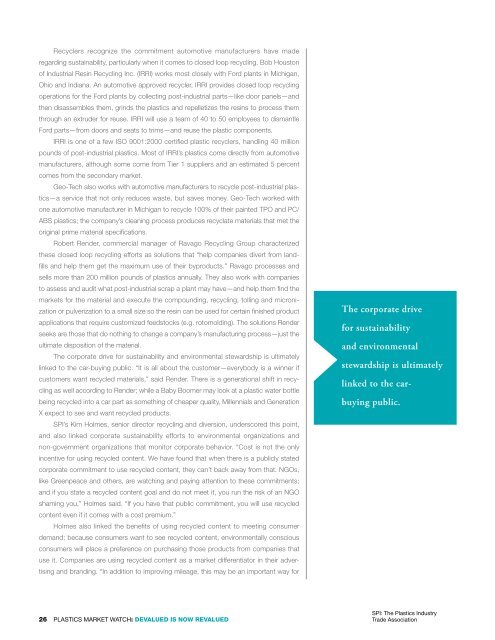Recycling Devalued is now Revalued
1SPybsx
1SPybsx
You also want an ePaper? Increase the reach of your titles
YUMPU automatically turns print PDFs into web optimized ePapers that Google loves.
Recyclers recognize the commitment automotive manufacturers have made<br />
regarding sustainability, particularly when it comes to closed loop recycling. Bob Houston<br />
of Industrial Resin <strong>Recycling</strong> Inc. (IRRI) works most closely with Ford plants in Michigan,<br />
Ohio and Indiana. An automotive approved recycler, IRRI provides closed loop recycling<br />
operations for the Ford plants by collecting post-industrial parts—like door panels—and<br />
then d<strong>is</strong>assembles them, grinds the plastics and repelletizes the resins to process them<br />
through an extruder for reuse. IRRI will use a team of 40 to 50 employees to d<strong>is</strong>mantle<br />
Ford parts—from doors and seats to trims—and reuse the plastic components.<br />
IRRI <strong>is</strong> one of a few ISO 9001:2000 certified plastic recyclers, handling 40 million<br />
pounds of post-industrial plastics. Most of IRRI’s plastics come directly from automotive<br />
manufacturers, although some come from Tier 1 suppliers and an estimated 5 percent<br />
comes from the secondary market.<br />
Geo-Tech also works with automotive manufacturers to recycle post-industrial plastics—a<br />
service that not only reduces waste, but saves money. Geo-Tech worked with<br />
one automotive manufacturer in Michigan to recycle 100% of their painted TPO and PC/<br />
ABS plastics; the company’s cleaning process produces recyclate materials that met the<br />
original prime material specifications.<br />
Robert Render, commercial manager of Ravago <strong>Recycling</strong> Group characterized<br />
these closed loop recycling efforts as solutions that “help companies divert from landfills<br />
and help them get the maximum use of their byproducts.” Ravago processes and<br />
sells more than 200 million pounds of plastics annually. They also work with companies<br />
to assess and audit what post-industrial scrap a plant may have—and help them find the<br />
markets for the material and execute the compounding, recycling, tolling and micronization<br />
or pulverization to a small size so the resin can be used for certain fin<strong>is</strong>hed product<br />
applications that require customized feedstocks (e.g. rotomolding). The solutions Render<br />
seeks are those that do nothing to change a company’s manufacturing process—just the<br />
ultimate d<strong>is</strong>position of the material.<br />
The corporate drive for sustainability and environmental stewardship <strong>is</strong> ultimately<br />
linked to the car-buying public. “It <strong>is</strong> all about the customer—everybody <strong>is</strong> a winner if<br />
customers want recycled materials,” said Render. There <strong>is</strong> a generational shift in recycling<br />
as well according to Render; while a Baby Boomer may look at a plastic water bottle<br />
being recycled into a car part as something of cheaper quality, Millennials and Generation<br />
X expect to see and want recycled products.<br />
SPI’s Kim Holmes, senior director recycling and diversion, underscored th<strong>is</strong> point,<br />
and also linked corporate sustainability efforts to environmental organizations and<br />
non-government organizations that monitor corporate behavior. “Cost <strong>is</strong> not the only<br />
incentive for using recycled content. We have found that when there <strong>is</strong> a publicly stated<br />
corporate commitment to use recycled content, they can’t back away from that. NGOs,<br />
like Greenpeace and others, are watching and paying attention to these commitments;<br />
and if you state a recycled content goal and do not meet it, you run the r<strong>is</strong>k of an NGO<br />
shaming you,” Holmes said. “If you have that public commitment, you will use recycled<br />
content even if it comes with a cost premium.”<br />
Holmes also linked the benefits of using recycled content to meeting consumer<br />
demand; because consumers want to see recycled content, environmentally conscious<br />
consumers will place a preference on purchasing those products from companies that<br />
use it. Companies are using recycled content as a market differentiator in their advert<strong>is</strong>ing<br />
and branding. “In addition to improving mileage, th<strong>is</strong> may be an important way for<br />
The corporate drive<br />
for sustainability<br />
and environmental<br />
stewardship <strong>is</strong> ultimately<br />
linked to the carbuying<br />
public.<br />
26 PLASTICS MARKET WATCH: DEVALUED IS NOW REVALUED<br />
SPI: The Plastics Industry<br />
Trade Association


